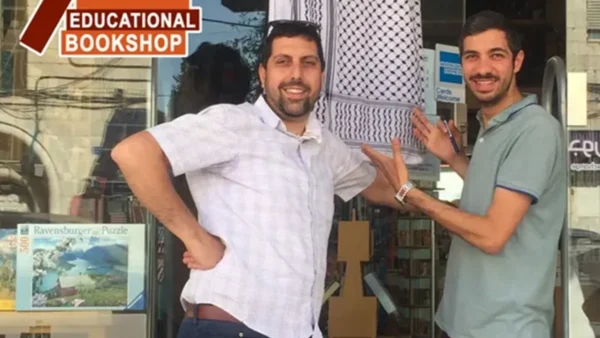The day started perfectly. A last-minute programme change and poor organisation meant that only two other people turned up to hear Ernesto Gonzalez and Andres Lofiego talk about their experience with occupying a printing factory in Buenos Aires. Sad for Ernesto and Andres, but lucky for me, because it turned the event into an intimate conversation rather than formal speeches.
It was fascinating to hear them talk about the occupation, particularly because apparently none of the workers were revolutionary or even left-wing – they were quite conservative in fact. It made me realise what people are capable of when circumstances force them to change. Ernesto was one of eight remaining workers in the Chilavert printing factory in 2002 – most of the others had left as Argentina’s economy collapsed and the factory owner had not paid them for months. The ones who stayed were the older workers, the more loyal or faithful ones who believed that things would turn around. Well, they did not. The factory went bankrupt and they all lost their jobs.
But rather than accept this, they occupied the factory. They reasoned that they were owed months of wages, and as workers they had a stronger claim to the factory than any other creditors. The police came in massive force to evict them, but the neighbourhood rallied round to protect them, throwing up barricades in the street and putting their own bodies in the way, betting correctly that the beleaguered government would not dare to start a confrontation with a large group of middle-aged women, especially as people like Andres Lofiego were there with cameras to document everything.
Although the police did not use force in the end, they did continue to blockade the factory for months, stopping any delivery lorries from getting through. A neighbour helped, though, by knocking a hole in his wall and letting the workers pass through the books they had printed, and then taking them off in his car to deliver to the customer. This went on for several months before they were able to join with other worker-occupied factories in Buenos Aires and lobby the local government for a law recognising their right to run the factory. They eventually obtained this, and are still running the factory today as a workers’ cooperative. The legal status was a little complicated, something slightly short of outright ownership, but enough to enable them to run the factory by themselves without owing rent to anybody. Anyway, it was fascinating to hear the story unfold. They basically had no ideology, no plan at all, but all they knew was that they had to keep on working to avoid the destitution that was engulfing many around them. They couldn’t let the factory die. I bought a book of photographs of the occupied factories, “No Pasar” by Andres Lofiego (printed and published, of course, by the Chilavert Cooperative!).
Next was Ghanaian activist Mani Tanoh speaking about the legacy of Kwame Nkrumah and the dream of African liberation. He praised Nkrumah’s strategy, laid out at the 1945 Pan-African Congress in Manchester, of mass mobilisation of workers and peasants to defeat colonialism. This was spectacularly more successful than the previous elitist movement of academics and professionals who confined themselves to polite petitions to the King. By 1951 a general strike in Ghana had catapulted him to leadership of the country, and by 1957 independence was won.
Tanoh was very critical, however, of what Nkrumah did once he gained power. He said Nkrumah posited the state as the only line of defence for the Ghanaian people against Western imperialism, and claimed any criticism of the state was a dangerous act of disloyalty. In 1964 Nkrumah declared a one-party state, and since he was head of the ruling party for life, that meant that effectively he was the ruler of Ghana for as long as he pleased. Everything was done in the name of the workers and peasants, but these classes were embodied in the person of the President. Dissent and class treason were made synonymous, and crushed. Tanoh drew a parallel with Robert Mugabe in Zimbabwe today, saying that by blaming every act of dissent on Western imperialism and demanding total unity in the form of obeisance to the state, he makes the same mistake as Nkrumah. In both cases, Western powers are certainly interfering (Nkrumah himself was eventually brought down by a CIA-backed coup). But ordinary people also have real grievances which they are not allowed to express without being labelled traitors and supporters of Western imperialism.
Michael Lowy then spoke after lunch about ecosocialism. Unlike the disastrous “ecology” talk yesterday, this one contained some real content. Lowy was quite a dry speaker but at least he was lucid, and most importantly he had something to say. Lowy pointed out the disturbing trend among world leaders towards talking about “adapting” to climate change. He highlighted a recent “Green Paper” produced by the European Union that said essentially climate change can’t be stopped so we have to adapt by building sea walls and relocating coastal towns inland, but don’t worry, there will be great business opportunities in all this reconstruction!
His point was that we can do better. Capitalism can’t, clearly. It’s own leaders have concluded that it can’t, and they are right. A system that measures success by growth in GDP, the amount of stuff produced, is completely incompatible with an age in which we need to cut down drastically on the amount of stuff we produce. Hence ecosocialism as the solution (the ‘eco’ added because socialism has also traditionally had a tendency to emphasise the production of large amounts of stuff, just under new management).
Lowy pointed out that scaling back on what we produce doesn’t necessarily have to reduce our quality of life. Most of the growth in GDP does not improve our lives one bit. The entire arms industry could go, for example, as could a large number of the gadgets and fashion accessories that we didn’t know we wanted until some advertiser told us we did. More important areas of production, like education, healthcare, food and housing, could be increased. It’s about priorities. We should not let a group of business executives decide our priorities, nor should we let a technocratic state bureaucracy do it a la Soviet Union and Five Year Plans. We should decide our priorities by democratic planning. Vote on how much public transport you want this year. How many schools. How many hospitals. Trust the people to make the right decisions with the information available. If they’re free from the bombardment of advertising and corporate propaganda, and if they feel that they have some control over their lives and the political process, Lowy believes they will vote wisely.
As with all ideas that hinge on revolutionary transformation, he faced the question of how we get from A to B. His answer was that people do not learn through reading the learned articles we put together in left-wing magazines and books. Instead they learn through their own experience. So we must support even the smallest campaigns, the tiniest baby steps towards the goals we believe in. Because if these struggles are successful, those involved in them will have their consciousness raised, will believe that they can achieve things, and will take the next step themselves. Lecturing people and thrusting pamphlets in their face, or refusing to get involved with day-to-day issues because the participants are not revolutionary enough, is counterproductive and doomed to failure. A utopia doesn’t come about by waiting for it or even writing about it – it comes about through people building it brick by brick.
Finally Stathis Kouvelakis spoke about “France in revolt.” He was essentially exploring the apparent paradox in French political life: mass hostility to neoliberal policies (demonstrated time and again through strikes, student protests, the “no” vote to the European constitution, etc.) and yet electoral success for the most right-wing presidential candidate in decades. His explanation was that social resistance does not automatically produce political results. Somebody (i.e. left-wing political parties) needs to step in and translate popular discontent into the political arena, to give voters a realistic option.
The left-wing parties in France failed spectacularly to do this. The Socialist candidate Segolene Royal spoke out against almost everything the left believes in and proposed draconian law and order policies like sending young offenders to military boot camps. And on the far left there were four separate candidates, splitting the vote and making it impossible for any of them to have a chance. Kouvelakis said that in politics there can never be a void; when a political vacuum starts to develop, someone fills it. The left failed, so Sarkozy stepped in, offering a strong, authoritarian, law and order campaign which at least offered a solution to France’s problems, no matter how unpalatable to many people.
So, he said, we should never be content with single successes on social issues. We should always push to take popular mobilisations one step further and achieve concrete political effects. Otherwise the momentum dissipates and the moment is lost, allowing the right to step back in and offer its familiar promise of strength, order and economic growth.



There are 2 comments
Oi, achei teu blog pelo google tá bem interessante gostei desse post. Quando der dá uma passada pelo meu blog, é sobre camisetas personalizadas, mostra passo a passo como criar uma camiseta personalizada bem maneira. Se você quiser linkar meu blog no seu eu ficaria agradecido, até mais e sucesso. (If you speak English can see the version in English of the Camiseta Personalizada. If he will be possible add my blog in your blogroll I thankful, bye friend).
Good post.